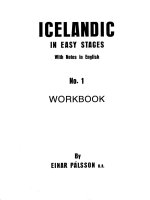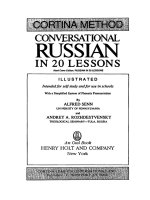Amglish in like ten easy lessons
Bạn đang xem bản rút gọn của tài liệu. Xem và tải ngay bản đầy đủ của tài liệu tại đây (7.5 MB, 441 trang )
Amglish in, Like, Ten
Easy Lessons
Amglish in, Like, Ten
Easy Lessons
A Celebration of the
New World Lingo
Arthur E. Rowse
with illustrations by John
Doherty
4/441
ROWMAN & LITTLEFIELD PUBLISHERS, INC.
Lanham • Boulder • New York • Toronto •
Plymouth, UK
Published by Rowman & Littlefield Publishers, Inc.
A wholly owned subsidiary of
The Rowman & Littlefield Publishing Group, Inc.
4501 Forbes Boulevard, Suite 200, Lanham, Maryland
20706
Estover Road, Plymouth PL6 7PY, United Kingdom
Distributed by NATIONAL BOOK NETWORK
Copyright © 2011 by Rowman & Littlefield Publishers, Inc.
All rights reserved. No part of this book may be reproduced
in any form or by any electronic or mechanical means, including information storage and retrieval systems, without
written permission from the publisher, except by a reviewer
who may quote passages in a review.
British Library Cataloguing in Publication Information
Available
Library of Congress Cataloging-in-Publication Data
Rowse, Arthur E. (Arthur Edward)
Amglish in, like, ten easy lessons : a celebration of the new
world lingo / Arthur E. Rowse ; with illustrations by John
Doherty.
p. cm.
Includes index.
ISBN 978-1-4422-1167-4 (pbk. : alk. paper) —
ISBN 978-1-4422-1168-1 (electronic)
6/441
1. English language—United States—Slang. 2.
Americanisms.
I. Title.
PE3729.U5R69 2011
427'.973—dc23
2011022884
™ The paper used in this publication meets the minimum
requirements of American National Standard for Information Sciences—Permanence of Paper for Printed Library
Materials, ANSI/NISO Z39.48-1992.
Printed in the United States of America
Preface
When I was growing up in Lexington, Massachusetts, in the 1920s, we had no “language arts” in my public grade school. We
had separate classes in English grammar,
spelling, and penmanship run by no-nonsense teachers. Despite having much difficulty twisting my wrist into the prescribed
position for perfect penmanship in the
Palmer style, I learned to love the language
even with its many idiosyncrasies.
I liked to read books about boys going on
great adventures and playing tricks on
8/441
people. They made me want to write for fun
or money. But since there were not many
such paying jobs for ten-year-olds, I created
my own job by starting a weekly neighborhood newspaper. I got the idea when my
father gave me a cast-off Remington typewriter after I had spent a day “helping” him
at his office.
My first brush with censorship came early
when I put a snide dinner-table quip from
my father into print. He had said a neighbor’s new baby girl had been named “Hope”
because the parents were hoping for a boy.
My father made me run a crayon through the
disputed sentence. I made sure the words remained visible. (The rebellious quality comes
from living in “the birthplace of American
liberty.”)
My first bout with a stilted language came
on graduation day after six grades at Hancock School when I was awarded a prize for
scholastic excellence. I was hoping for
9/441
something useful such as a chocolate cake,
certainly not a copy of Master Skylark, a Story of Shakespeare’s Time, published in
1897.
When I opened the book later and read the
first page of flowery British prose by author
John Bennett about “punts . . . poling slowly
on the Avon” and “April sunlight dancing on
the brazen horns and the silver bellies of the
kettledrums,” I put the book down for good.
It was not my kind of English.
After four years as editor and publisher of
the Naborhood News, I retired because of issues—today’s in-word for such complications
as schoolwork—that led to an editorial in the
town weekly titled “Why Editors Quit.” I
eventually fell into some “higher education,”
World War II duty in North Africa and Italy,
the authorship of a few books, and a string of
editing and writing jobs mostly at Boston
and Washington newspapers, where some
10/441
knowledge of formal English was still
required.
It wasn’t until much later in life that I realized why my neighbors and relatives were
willing to pay two pennies to read the
Naborhood News. I concluded that it was
not for the news, which was little more than
a reflection of family dinner conversations. It
was to laugh at all my malapropisms and
mistakes in grammar and spelling. I remember one headline, BUM BITES GAS MAN, referring to a neighborhood dog.
By the time my own kids went to public
school in Washington, D.C., in the 1960s,
“language arts” were beginning to supplant
the much-despised classes in grammar,
spelling, and penmanship in some schools,
though not yet in our neighborhood school.
In fact, unknown to me at the time, the main
English teachers’ association of the country
officially condemned separate classes in
grammar in 1963, the all-time peak year for
11/441
verbal SAT scores. I suspect that not many
parents knew that “grammar” had become a
dirty word.
In the next few decades, I became increasingly shocked at the failure of many Americans—at all levels of society—to absorb the
basic fundamentals of their native language.
My shock turned into disdain, especially for
well-educated people who apparently didn’t
know the difference between lay and lie, that
and which, and other fine points of proper
English such as differentiating between subjective pronouns and objective ones.
But I had a linguistic epiphany after George
W. Bush became president in 2000. Here
was a budding world leader, a man of great
privilege enhanced by education at prestigious schools, who appeared woefully unable
to mouth a simple sentence without violating
at least four or five basic precepts of English.
At first, I marveled at how blasé Americans
12/441
were about choosing a leader with such a
gross deficiency in his mother tongue.
I joined millions of other people around the
world snickering at the way the nation’s most
prominent bushwhacker shredded the language in such funny ways. It was during one
of those laugh-ins I finally realized, languagewise, here was a politician who did not
speak much differently from other Americans, including at times my friends, associates, and myself.
It also began to strike me that nobody can
be a perfect master of English. Indeed, it is
an impossibility because of the language’s
many mysteries and defects. We all make errors when using our native language, regardless of our education.
I began to realize that language errors have
become an integral part of the current linguistic upheaval. Even more interesting are
the many efforts to be original. New words
and phrases are bubbling up at a furious
13/441
pace, either by accident or design. And those
who are not innovators help the process by
passing along anything interesting that they
encounter. The whole exercise is either a delight or a continuing disaster, depending on
your point of view.
I chose the positive approach and became
taken in by the charms of informal English,
especially the neologisms, the grammatical
variations, the innovative texting, the flood
of acronyms, the smiley faces, and the disappearance of capital letters and punctuation. I
also realized that there is nothing anyone can
do to stop language from constantly
changing.
The growing informality of American English mirrors what is happening to society itself. Just as most people are now choosing
casual clothing, they are also becoming informal with language. It has become the inway to bond with friends and associates
while keeping pace with the latest trends.
14/441
I began to catch some of George W’s joviality with language and to recognize the camaraderie and, yes, even excitement that
goes with using language in new, more interesting, more enjoyable, more imaginative
ways.
I also realized that it was no longer teachers
and lexicographers who were shaping language. It was the great masses of ordinary
people, especially young musicians, humorists, writers, and general dissidents who
were leading the way. The process is a constant, natural churning that no language police or remedial teachers can alter.
Suddenly, it seems, almost everybody is
speaking and writing more freely and enjoying it more. Many of the rules and standards
that have served for more than four centuries
are quietly being shelved as we speak and
write. We are all constantly creating the new
language that is Amglish, the title that some
people have already given to it.
15/441
This is a momentous development at an exciting time. As if to prove the point, the top
two editors of the popular online Politico reported in December 2010: “More traffic
comes from an item on Sarah Palin’s ‘refudiate’ . . . than from our hundreds of stories on
the complexities of health care reform or
Wall Street regulation.”
Such massive attention to language change
is unprecedented, and it’s worldwide. The
subject itself is so huge and so fluctuating
that no book can do more than merely
scratch the surface of the story. The field is
wide open for further exploration.
While this book seeks to share the thrills of
the emerging Amglish, it also recognizes the
urgent need, especially for young people, to
become proficient in their native language,
whatever it is. The ultimate cool is knowing
how and when to use the prevailing language
of business and government for one’s own
16/441
benefit while fully enjoying the “current”
wild world of informal language.
In order to paint a full and honest picture
of today’s language scene, I have let bits of
Amglish fall naturally into parts of this book.
My secret hope is that doing so will, like, give
me immunity from any criticism about the
way that, you know, the book is written.
Let the celebration begin.
Acknowledgments
FROM THE AUTHOR
A book like this one could not be done
without the expert help and willing cooperation of many people, including some who are
not aware of the roles they played in providing the evidence needed to illustrate the
book’s unassailable theses.
As the author, I would first like to credit my
wife, Ruth Fort, for rekindling my interest in
language with a book gift years ago relating
to Sam Johnson’s famous dictionary. I am
deeply in debt to her for her unsurpassed
18/441
editing and advice from the very beginning
of this project. I am also grateful for her toleration of my single-minded devotion to an
inanimate object for five years. I would like
to put any gross errors on her shoulders, but
that would be my first error.
Next, I would like to sincerely thank the
world’s greatest caricaturist, John Doherty,
for his excellent work so prominent in these
pages. John and I first collaborated in producing the famous Bush House of Cards in
2003. I also would like to thank his wife
Judith for her extremely careful editing and
generous advice.
I give special thanks to Niels Aaboe, Janice
Braunstein, Sarah David, Matt Evans,
Marissa Parks, and Sam Caggiula at Rowman
& Littlefield Publishers for seeing the possibilities of such a book in the first place and for
their advice and help since that momentous
decision.
19/441
Still others who deserve very special mention include John Adams, Tony Badran,
Carole Berke, Daniel Bouskela, Maria Angela
Loquercio Bouskela, Feodor Bratenkov, Monique Briendwalker, Robert Chaddock, Margaret Chapin, David Crystal, George Dahl,
Paul Dickson, Tsomo Faith, Adam Faulkner,
John Fitzgerald, Jurgen Flach, Arthur Fort,
Andrew Grant, Irene Grossman, Nick Grossman, Yi Han, Florence Lloyd, Charles Lund,
Jay Matthews, Alexander Michaelson, Matthew Michaelson, Ahmed Moamber, Amal
Mudallali, William Powers, Martha Rowse,
Jim Roy, Julie Schoo, Molly Silvia, Denise
Terry, Donald Terry, Tsemdo Thar, Serdar
Tonbul, Larry Torres, Lowell Vizenor,
Lawrence White, and Dario Zuddu.
FROM THE ILLUSTRATOR
One day in 2003, my phone rang and it was a
man named Arthur Rowse proposing a collaboration on our project that became the
20/441
Bush House of Cards. My response to him
then was, “Boy, did you get the right number!” His vision on that project and on this
book has been an inspiration to me. It’s a
great privilege to craft his ideas into visual
form. His command of the language, his wit,
and his ability to connect the dots sent me
eagerly flying to the drawing board. So,
thanks to him for making that call and for inviting me to share this work.
My greatest support and inspiration in my
art and life is my wife, Judith Doherty. Her
experience as a writer and editor added another set of eyes to this project, all the while
juggling her own work and freelance schedule. And we stayed married! Thanks to Niels
Aaboe, Sarah David, and all the staff at Rowman & Littlefield for their support.
Made in the U.S.A.
Peaceful Muslims, pls refudiate.
—Sarah Palin on Twitter, July 18, 2010
With her words above, the former Republican vice presidential nominee was trying to
urge people to reject a proposed Muslim center two blocks from Ground Zero in New
York City. She immediately drew some flak
for partially misidentifying the issue and maligning Muslims. So she toned down the
wording in a subsequent tweet.
But her worst crime, judging from press reaction, was to make up the term refudiate.
23/441
Grammarians were shocked. Journalists exploded. “There’s no such word,” they shouted
in print and on Twitter as they relished one
more chance to show that the feisty former
Alaska governor was out of touch with
reality.
The flames temporarily singed Palin into
hastily substituting the word refute. When
that didn’t work, she fired back, adding an
old gem from former president George W.
Bush and some slang for getting too excited:
“Refudiate, misunderestimate, wee-weed
up. English is a living language. Shakespeare
liked to coin words too. Got to celebrate it!”
Write on, Sarah! It’s time to celebrate the
new lingo that’s sweeping around the world.
All nitpickers should put their picks away.
Let’s face it, formal English is dying. A new,
much less formal language is taking over this
country and the world. And it’s time to welcome it with open arms. In fact, there’s no
way to stop it.
24/441
IN PRAISE OF PALIN
Asher Smith, a reporter for the Huffington
Post, was notable in his objection to the firing squad lined up against the former Alaska
governor. “Hand it to Palin,” he wrote. “Refudiate is catchy and sounds right to the ear.”
Smith had a point. Palin’s word could be
considered more logical than many words
already accepted in the famously illogical
English language.
What was so wrong about combining refute
and repudiate? Palin had used the word a
few days earlier on The Sean Hannity Show
without arousing any reaction. Palin obviously assumed that was enough approval to
make it an OK word in today’s environment.
She knew that the ultraconservative host
would not allow a verbal abortion on his
program.
And what about Palin’s abbreviation for
please? This slimmed-down version of the
word was propelled by the advent of texting
25/441
and has become so universally understood
and accepted, especially on Facebook and
Twitter, that none of her detractors even
mentioned it. Language establishment leaders may not have been plsd, but they are no
longer able to control the spelling of many
wds, especially now that so many people are
alluva twitter about language.
THE QUIRKS OF ENGLISH
For centuries, Americans have been trying to
deal with the mysteries of the language their
forebears heedlessly brought with them from
England in the seventeenth century. No other language has ever been stitched together
by so many sight-impaired, hearingimpaired, tongue-impaired babblers into
such a crazy quilt of rules and traditions.
Numerous books, including many recent
ones, have been written to show people how
to comply with the increasingly outmoded
requirements. Some sell well perhaps









